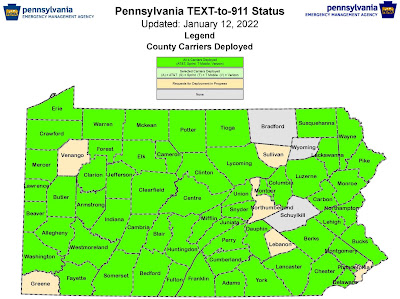From a joint press conference held by the Pennsylvania State Police and the Pennsylvania Emergency Management Agency:
FOR IMMEDIATE RELEASE
January 13, 2022
Transition to 5G Cellular Service Will Cause Older 3G Phones to Stop Operating in 2022
Harrisburg, PA – The Pennsylvania Emergency Management Agency (PEMA) and Pennsylvania State Police (PSP) are urging residents with older cell phones to prepare for the phase-out of 3G cellular networks and service in 2022.
“The best plan of action is to contact your service provider to determine if your devices are compliant,” said PEMA Deputy for 911 Jeff Boyle. “It’s important to plan now so you don’t lose connectivity.”
The nation’s three major wireless carriers (AT&T, Verizon, and T-Mobile) have announced plans to shut down their 3G networks to accommodate more advanced services, including 5G, as early as February 2022.
As a result, many older phones will be unable to make or receive calls and text messages or use data services. This may also affect other devices that rely on 3G connectivity, such as medical alert devices, tablets, smartwatches, home security systems, and in-vehicle safety, security, and roadside assistance systems.
“If your mobile phone is more than a few years old, you may need to upgrade your device before your provider shuts down its 3G network and you lose service – including the ability to call 911,” said Lt. Adam Reed, PSP Communications Office Director. “During an emergency, every minute counts whether you need police, fire, or medical assistance.”
Most users of these services will be notified directly by the carriers if this discontinuation affects them. However, users of older phones that are used only for 911 connectivity may not receive the notification if they do not have active service with a carrier. Organizations that serve individuals experiencing homelessness or survivors of domestic violence sometimes provide clients with older phones without a service plan for making emergency calls. Users of these types of 911 only phones should check with the organization that provided the phone about their options.
Low-income individuals concerned that their 911 only phones will no longer be supported should consider applying for service through the Federal Communications Commission’s Lifeline program. Information about eligibility, participating providers, and the application process can be found at https://www.lifelinesupport.org
About 911 in Pennsylvania:
Approximately 70 percent of 911 calls in Pennsylvania are made from a mobile phone each year, either by a voice call or a text message. Text-to-911 is not yet available in all counties. You can find the status of the text-to-911 service in the county where you live or work online at: https://www.pema.pa.gov
While voice calls to 911 are always preferred, there are situations where texting may be necessary:
• Making noise may endanger the caller;
• Someone is suffering a medical emergency that makes them unable to speak; or
• Individuals have speech or hearing impairments.
In Pennsylvania, each county is responsible for providing 911 service within their jurisdiction through a centralized Public Safety Answering Point (PSAP) where all incoming 911 calls are received and dispatched to the appropriate local police, fire, or emergency medical service responders.
Pennsylvania has 61 PSAPs serving 67 counties. A county may provide 911 service through participation in a regional 911 system.
Pennsylvania’s PSAPs process approximately 14.5 million requests for emergency services every year.
MEDIA CONTACTS:
Ruth A. Miller (PEMA) – ruthmiller@pa.gov
PSP Communications – 717-783-5556; ra-pspcomm@pa.gov

No comments:
Post a Comment